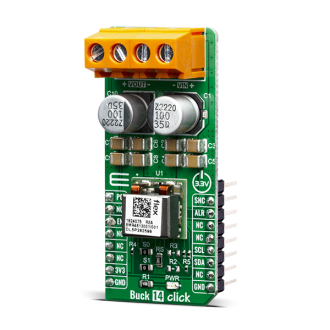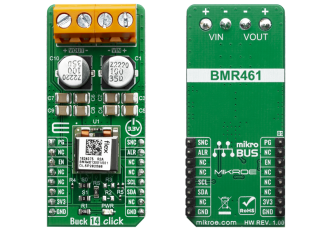
We strongly encourage users to use Package manager for sharing their code on Libstock website, because it boosts your efficiency and leaves the end user with no room for error. [more info]

Rating:
Author: MIKROE
Last Updated: 2019-11-18
Package Version: 1.0.0.0
mikroSDK Library: 1.0.0.0
Category: Buck
Downloaded: 3709 times
Not followed.
License: MIT license
The Buck 14 click is a Click board based around the BMR4613001/001, a PoL regulator from Flex. It's igh-efficiency step-down converter which provides a highly regulated output voltage derived from the connected power source, rated from 4.5 to 14V.
Do you want to subscribe in order to receive notifications regarding "Buck 14 click" changes.
Do you want to unsubscribe in order to stop receiving notifications regarding "Buck 14 click" changes.
Do you want to report abuse regarding "Buck 14 click".


Library Description
Library provides control over device pins, you can read state of some pins. You have ability to send and receive data from device, and control output V.
Key functions:
void buck14_read_data (uint8_t cmd, uint8_t *data_buf, uint8_t n_buf_size ) - Reads data from specific registar to buffervoid buck14_write_data (uint8_t cmd, uint8_t *data_buf, uint8_t n_buf_size ) - Writes data to specific registar to bufferuint8_t buc14_write_vout( float vout ) - Sets output Vuint16_t buc14_read_vout( void ) - Returns output V in mVExamples description
The application is composed of three sections :
void application_task ( )
{
vout_value = 1.2;
status_data = buc14_write_vout( vout_value );
error_handler( status_data );
if ( status_data == BUCK14_SUCCESSFUL )
{
read_vout_data( );
}
Delay_ms( 8000 );
vout_value = 3.7;
status_data = buc14_write_vout( vout_value );
error_handler( status_data );
if ( status_data == BUCK14_SUCCESSFUL )
{
read_vout_data( );
}
Delay_ms( 8000 );
vout_value = 2.5;
status_data = buc14_write_vout( vout_value );
error_handler( status_data );
if ( status_data == BUCK14_SUCCESSFUL )
{
read_vout_data( );
}
Delay_ms( 8000 );
vout_value = 4.5;
status_data = buc14_write_vout( vout_value );
error_handler( status_data );
if ( status_data == BUCK14_SUCCESSFUL )
{
read_vout_data( );
}
Delay_ms( 4000 );
mikrobus_logWrite( "```````````````", _LOG_LINE );
Delay_ms( 4000 );
}
Additional Functions :
Note :
Other mikroE Libraries used in the example:
Additional notes and informations
Depending on the development board you are using, you may need USB UART click, USB UART 2 click or RS232 click to connect to your PC, for development systems with no UART to USB interface available on the board. The terminal available in all MikroElektronika compilers, or any other terminal application of your choice, can be used to read the message.